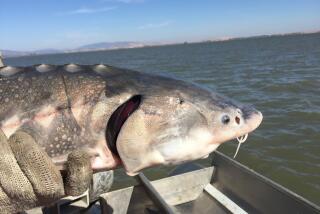We Don’t Yet Know Risks to Squid Harvest
- Share via
I guess I shouldn’t be surprised to read another story concerning our exploitation of the wild animals of the seas, but the squid story in your Jan. 21 edition (“Ventura Area’s Squid is Satisfying Appetite of Overseas Markets”) just reinforces my feelings. In your article, a Fish and Game marine biologist says his agency sees no reason to place restrictions on squid fishing because there does not seem to be an imminent risk to the local squid population.
How does one define imminent risk when little is known about what sustains the local population? Just because this may be another “record year,” does this imply that we are not somehow damaging the next generation of squid from also producing a record year? The answer to the question is simple: We do not know. The one thing we do know is that the squid are here because they have been successful in producing enough offspring that reached sexual maturity to continue the life cycle. The winter is when the squid spawn at our near-shore submarine canyons. This is also the time when fishermen are hauling in tons of squid.
I enjoy seafood and also appreciate the hard work it takes to make a living from the sea. What disturbs me is that we do not learn from our mistakes. Previous generations have claimed ignorance while exploiting marine species, falsely thinking the ocean provided an inexhaustible supply of oil and food. Fishing industries up and down both coasts have proven repeatedly that they will exploit a “resource” (cod, abalone, shark etc. . . ) until laws prevent depleting a species.
Unfortunately, these laws are usually written after an “imminent risk” is defined. Education about our ocean world has come a long way in recent years, but obviously more is needed if future generations are to enjoy the beauty and bounty of the sea.
STEVEN SINGER
Northridge

